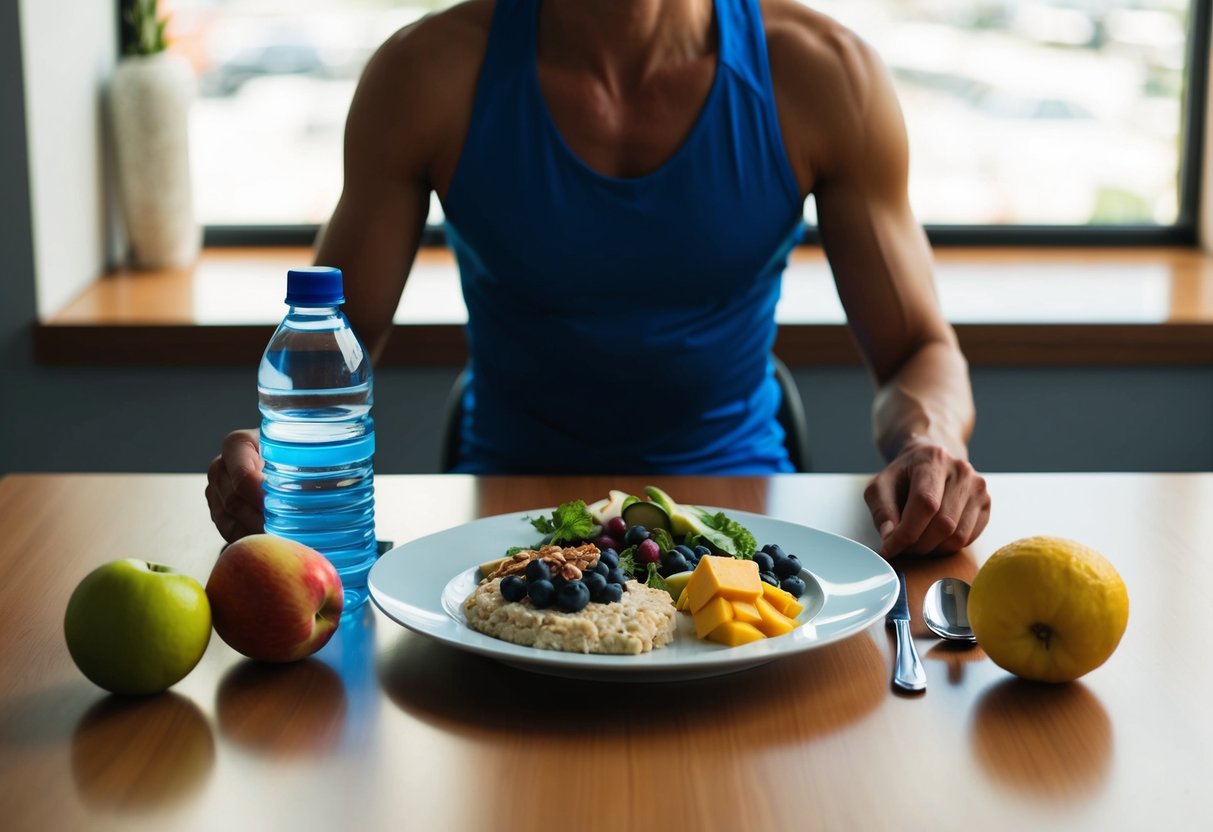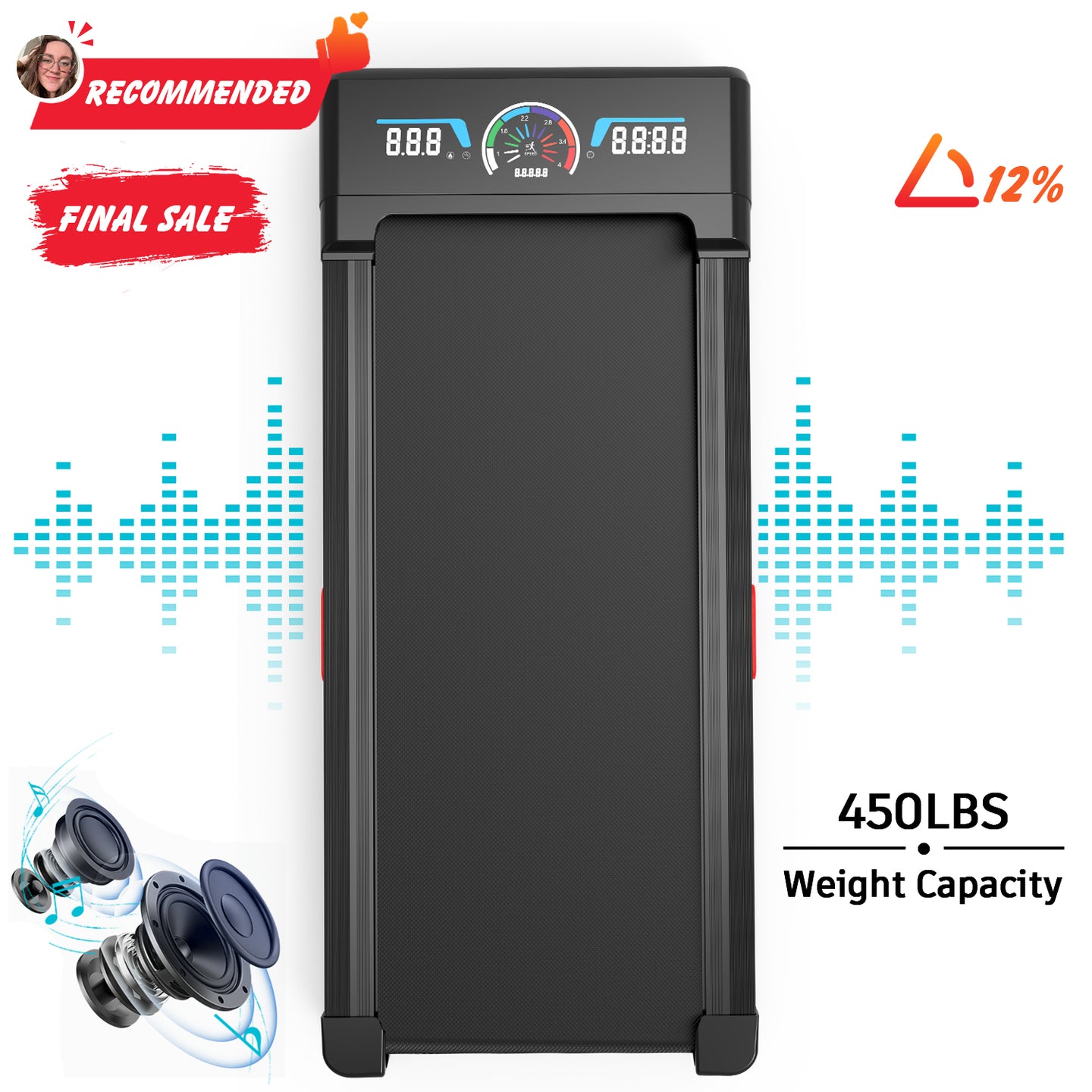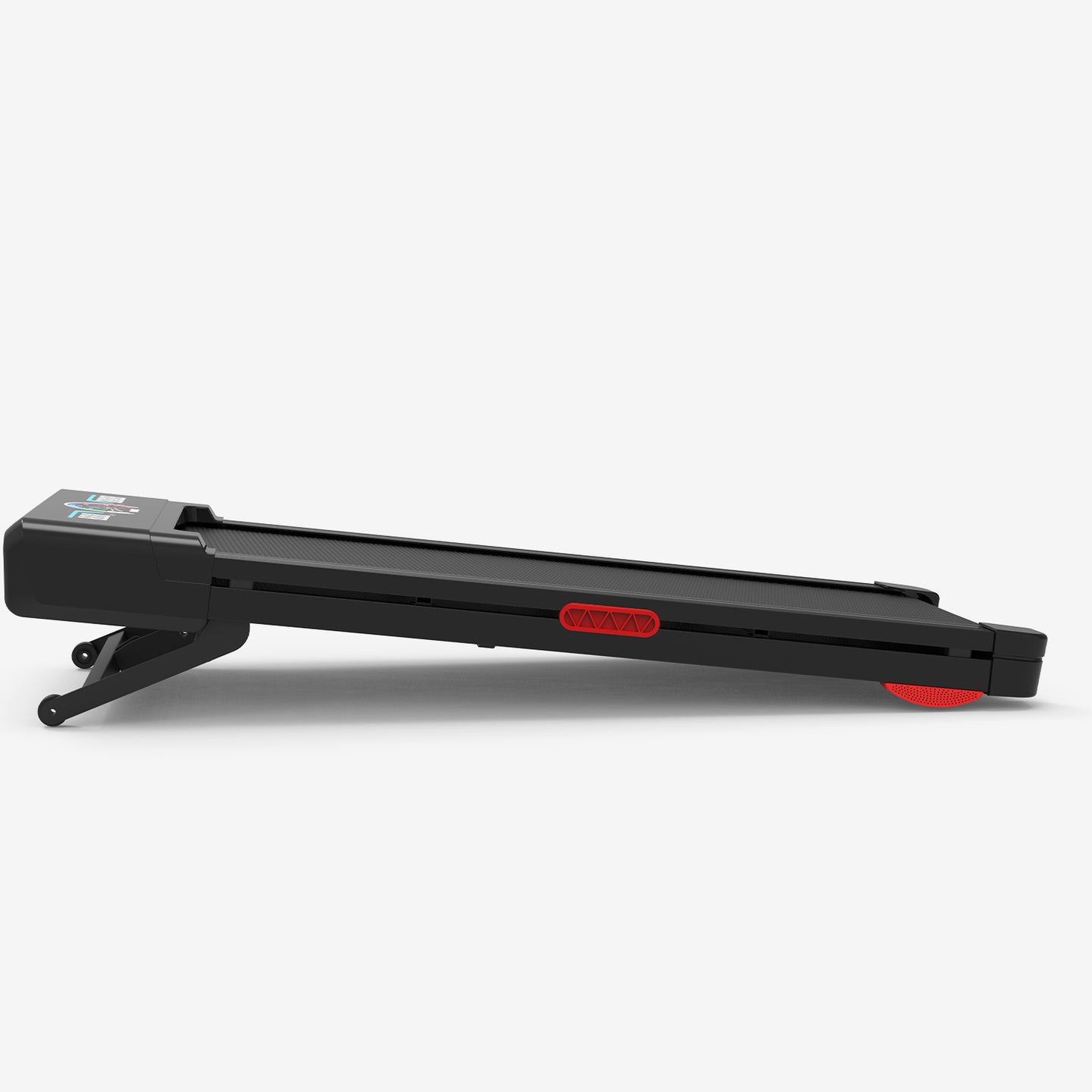What to Eat After a Run

Don’t forget to check out our Pacerocker, Trailviber, and Trailviber Auto Incline walking pad treadmills.
Refueling after a run is crucial for recovery and performance. Proper post-run nutrition replenishes energy stores, repairs muscle tissue, and supports overall health. Consuming a balanced mix of carbohydrates and protein within 30 minutes of finishing your run is ideal for optimal recovery.
We've all felt that post-run hunger, but choosing the right foods can make a big difference. Opt for easily digestible carbs like fruits, whole grains, or sports drinks to restore glycogen. Pair these with lean proteins such as eggs, Greek yogurt, or chicken to aid muscle repair.
Don't forget about hydration! Replacing fluids lost through sweat is just as important as refueling with food. Aim to drink water or an electrolyte-rich beverage along with your post-run meal or snack.
Key Takeaways
- Eat a mix of carbs and protein within 30 minutes after running
- Choose easily digestible foods to replenish energy and repair muscles
- Rehydrate with water or electrolyte drinks alongside your post-run meal
The Importance of Post-Run Nutrition
Proper nutrition after a run is crucial for our bodies to recover and adapt to the stress of exercise. It helps us replenish energy stores, repair muscles, and maintain hydration levels.
Replenishing Glycogen Stores
Our muscles rely on glycogen for energy during exercise. After a run, these stores are depleted and need to be refilled. Consuming carbohydrates within 30 minutes post-run is key.
Good options include:
- Fruit smoothies
- Whole grain toast with banana
- Greek yogurt with berries
These foods provide quick-absorbing carbs to kickstart the recovery process. Aim for about 0.5-0.7 grams of carbs per pound of body weight.
For longer runs, we may need to increase this amount. Pairing carbs with a small amount of protein can enhance glycogen replenishment.
Muscle Repair and Recovery
Running causes micro-tears in our muscles. Protein is essential for repairing this damage and building stronger muscles.
Ideal protein sources post-run:
- Lean meats (chicken, turkey)
- Fish
- Eggs
- Plant-based options (tofu, legumes)
We should aim for 15-25 grams of protein within an hour after our run. This helps stimulate muscle protein synthesis and reduces muscle soreness.
Consuming a balanced meal with both carbs and protein is often the best approach. A turkey sandwich on whole grain bread or a vegetable omelet with toast can be perfect choices.
Hydration and Electrolyte Balance
Proper hydration is vital for recovery and performance. We lose fluids through sweat during runs, which need to be replaced.
Tips for post-run hydration:
- Drink water immediately after finishing
- Aim for 16-24 ounces of fluid for every pound lost during the run
- Include electrolyte-rich foods or drinks
Sports drinks can be helpful for longer runs, but water is usually sufficient for shorter distances. Eating fruits like watermelon or oranges can provide both hydration and essential nutrients.
Electrolytes like sodium, potassium, and magnesium are lost through sweat. We can replenish these with foods such as bananas, sweet potatoes, or nuts. A small pinch of salt in our recovery drink can also help restore sodium levels.
Macronutrients: The Building Blocks
After a run, our bodies need specific nutrients to recover and rebuild. Let's explore the key macronutrients that play crucial roles in post-run nutrition.
Carbohydrates: Restoring Energy
Carbs are our body's primary fuel source during exercise. After a run, we need to replenish glycogen stores quickly. Aim for 0.5-0.7 grams of carbs per pound of body weight within 30 minutes post-run.
Some excellent carb sources include:
- Fruits (bananas, berries)
- Whole grains (oatmeal, brown rice)
- Starchy vegetables (sweet potatoes, squash)
These foods provide a mix of simple and complex carbohydrates, helping to restore energy levels and support recovery.
Protein: Essential for Muscle Repair
Protein is crucial for repairing and rebuilding muscle tissue damaged during our run. We should consume 15-25 grams of high-quality protein within an hour after finishing.
Great protein options:
- Greek yogurt
- Lean meats (chicken, turkey)
- Eggs
- Plant-based sources (tofu, lentils)
Combining protein with carbs can enhance recovery and promote muscle glycogen synthesis. A smoothie with fruit and whey protein or a turkey sandwich on whole-grain bread are excellent choices.
Fats: A Cautionary Note
While fats are essential for overall health, they're not the primary focus immediately after a run. Consuming too much fat post-exercise can slow down digestion and nutrient absorption.
We should focus on small amounts of healthy fats:
- Avocado
- Nuts and seeds
- Olive oil
These can be incorporated into post-run meals but shouldn't be the main focus. A small handful of almonds or a tablespoon of chia seeds in a smoothie can provide beneficial fats without hindering recovery.
Timing Your Post-Run Meal
Proper timing of your post-run meal is crucial for optimal recovery and performance gains. Let's explore when to eat and how it impacts your body after a run.
The Anabolic Window
The anabolic window refers to the period immediately following exercise when our bodies are primed to absorb nutrients. We used to think this window was only 30-60 minutes long, but recent research suggests it's wider than that.
Eating within 2 hours after a run is ideal. This timing helps replenish glycogen stores and provides protein for muscle repair. For longer or more intense runs, aim to eat sooner rather than later.
A quick snack like a banana with peanut butter or a protein shake can jumpstart recovery if you can't have a full meal right away.
Continuous Recovery
While the post-run meal is important, recovery doesn't stop there. Our bodies continue to repair and adapt for hours after exercise.
Eating regular, balanced meals throughout the day supports this ongoing process. Aim for a mix of carbs, protein, and healthy fats at each meal.
Hydration is also key. We should continue drinking water or electrolyte-rich beverages beyond our immediate post-run drink.
Sleep plays a crucial role in recovery too. A good night's rest helps our bodies repair and adapt, making the most of our nutritional intake.
Sample Meals and Snacks
After a run, we need the right mix of nutrients to replenish our energy and support recovery. Here are some tasty options to fuel up post-workout.
Quick and Easy Snacks
Greek yogurt with berries and granola provides a perfect balance of protein and carbs. We love this combo for its simplicity and nutrition punch. A banana with almond butter is another go-to snack, offering potassium and healthy fats.
For a savory option, whole grain crackers with hummus hit the spot. The crackers give us carbs while the hummus adds protein and fiber. Hard-boiled eggs with a piece of fruit make a portable snack we can prep ahead of time.
Smoothies are a refreshing choice. We blend milk, frozen fruit, and a scoop of protein powder for a quick and tasty drink.
Balanced Meal Ideas
A turkey and avocado sandwich on whole grain bread is a satisfying post-run meal. We add lettuce and tomato for extra nutrients and crunch.
Grilled chicken with quinoa and roasted vegetables makes a nutrient-dense plate. We season the chicken with herbs and toss the veggies in olive oil for flavor.
For breakfast lovers, an omelet with spinach, cheese, and whole grain toast provides a protein-rich option. We sometimes add a side of fruit for natural sweetness.
A bowl of oatmeal topped with nuts, seeds, and sliced apple is comforting and nutritious. We stir in a spoonful of honey for a touch of sweetness.
Hydration Strategies
Proper hydration is crucial for post-run recovery. Let's explore effective ways to replenish fluids and maintain electrolyte balance.
Water Intake
After a run, we need to replace the fluids lost through sweat. Aim to drink 16-24 ounces of water for every pound lost during exercise. It's best to sip water gradually rather than gulping large amounts at once.
We can check our hydration status by monitoring urine color. Light yellow indicates good hydration, while dark yellow suggests we need more fluids.
For longer runs lasting over 90 minutes, we should start rehydrating during the activity. Carrying a water bottle or planning a route with water fountains can help us stay on top of our fluid intake.
Electrolyte-Rich Fluids
Sweating depletes our body's electrolytes, especially sodium and potassium. Sports drinks can help replenish these essential minerals quickly.
We can also opt for natural electrolyte sources:
- Coconut water
- Watermelon juice
- Milk or chocolate milk
For a homemade electrolyte drink, mix:
- 2 cups water
- 1/4 tsp salt
- 2 tbsp honey or maple syrup
- 1/4 cup fresh lemon or lime juice
This DIY option provides a cost-effective way to restore electrolyte balance without added preservatives or artificial flavors.
Supplements for Runners
Proper nutrition and supplementation can enhance recovery and performance for runners. Let's explore some key supplements that can benefit those who enjoy hitting the pavement or trails.
Protein Powders
Protein powders offer a convenient way to boost our post-run recovery. We've found whey protein to be particularly effective due to its rapid absorption. It helps repair muscle tissue and supports strength gains.
Plant-based options like pea or rice protein are great for vegan runners. These can be just as effective when consumed in adequate amounts. We recommend aiming for 20-30 grams of protein within 30 minutes after a run.
Protein shakes are easy to prepare and carry. They're ideal for busy runners who can't always sit down for a full meal right away.
BCAAs and Amino Acids
Branched-Chain Amino Acids (BCAAs) play a crucial role in muscle recovery and reducing fatigue. We've seen benefits from taking BCAAs before, during, or after long runs.
Leucine, isoleucine, and valine are the key BCAAs to look for in supplements. They can help prevent muscle breakdown during intense training.
Other amino acids like glutamine may also aid recovery. Some runners report reduced muscle soreness when supplementing with glutamine.
It's important to note that a balanced diet often provides sufficient amino acids. Supplements can be helpful for very intense training or when dietary intake is limited.
Recovery Supplements
Electrolyte supplements are essential for replacing minerals lost through sweat. We find them particularly useful for runs lasting over an hour or in hot conditions.
Magnesium supplements can help prevent muscle cramps and improve sleep quality. This is crucial for recovery between training sessions.
Tart cherry juice has shown promise in reducing inflammation and muscle soreness. We often drink it after hard workouts or races.
Beta-alanine is another supplement that may improve endurance performance. It works by increasing muscle carnosine levels, potentially delaying fatigue during high-intensity efforts.
Understanding Your Body's Signals
Post-run nutrition involves tuning into our body's needs. Recognizing hunger and fullness cues helps us refuel effectively and avoid overeating.
Listening to Hunger Cues
After a run, our body often sends clear signals when it needs nourishment. We might feel a rumbling stomach or light-headed sensation. These are signs it's time to eat.
Ignoring these cues can lead to fatigue and poor recovery. It's best to eat within 30 minutes of finishing our run, even if we don't feel very hungry.
Sometimes, intense exercise can temporarily suppress appetite. In this case, we should still aim for a small snack to kickstart recovery.
Recognizing Fullness
As we refuel, it's crucial to pay attention to feelings of satisfaction. Eating slowly allows our brain to register fullness, preventing overindulgence.
We should aim to feel comfortably full, not stuffed. This usually means eating until we're about 80% full.
Signs of fullness include:
- Decreased hunger pangs
- Feeling content
- Slight stomach expansion
If we're still hungry after our post-run meal, we can wait 15-20 minutes before deciding if we need more food. This gives our body time to process what we've eaten.
Long-Term Nutritional Considerations
Proper nutrition after runs supports both immediate recovery and long-term performance goals. Let's explore how to tailor our eating habits for sustained fitness progress.
Individual Dietary Needs
We're all unique, and our nutritional requirements reflect that. Some runners thrive on high-carb diets, while others perform better with more protein and healthy fats. It's crucial to listen to our bodies and adjust accordingly.
Experimenting with different macronutrient ratios can help us find our sweet spot. We might start by tracking our food intake and noting how we feel during runs and recovery periods.
Factors like age, gender, and genetics also play a role. A sports nutritionist can provide personalized advice based on our specific needs and goals.
Adapting to Training Cycles
Our nutritional needs shift as we move through different training phases. During high-intensity periods, we may need to increase our calorie and carbohydrate intake to fuel longer runs and aid recovery.
In contrast, off-season or maintenance phases might require fewer calories. We can focus on nutrient-dense foods to support overall health without unnecessary weight gain.
Hydration needs also fluctuate with training intensity and climate. We should adjust our fluid intake accordingly, especially in hot or humid conditions.
Regular check-ins with our bodies help us fine-tune our nutrition. Paying attention to energy levels, recovery times, and performance can guide our dietary choices for optimal long-term results.
Frequently Asked Questions
Post-run nutrition plays a crucial role in recovery, performance, and achieving fitness goals. We'll address some common questions runners have about what to eat after their workouts.
How can I optimize my meal for weight loss post-run?
Focus on lean proteins and vegetables after your run. Opt for grilled chicken breast with a large salad or steamed broccoli. Keep portions moderate and avoid high-calorie dressings or sauces.
Include a small amount of complex carbs like quinoa or sweet potato to replenish energy stores. Hydrate well with water or unsweetened tea to support metabolism and recovery.
Which foods should I focus on after running a 5K for recovery?
After a 5K, prioritize a mix of carbs and protein. A banana with Greek yogurt provides quick-acting carbs and muscle-repairing protein. Whole grain toast with almond butter is another great option.
Don't forget to rehydrate with water or an electrolyte drink. A small handful of nuts can help replace minerals lost through sweat.
What kind of diet will support muscle building after my run?
For muscle growth, emphasize protein-rich foods post-run. Lean meats, fish, eggs, or plant-based options like tofu are excellent choices. Pair these with complex carbs like brown rice or whole wheat pasta.
Add some colorful vegetables for micronutrients. A protein shake with fruit can be a convenient option if you're short on time.
Could you suggest a nighttime post-run meal for optimal recovery?
A light, balanced meal is best for nighttime recovery. Try grilled salmon with roasted sweet potato and steamed spinach. This combination provides protein, complex carbs, and nutrients without being too heavy.
If you prefer something simpler, cottage cheese with sliced peaches can offer protein and carbs. Avoid large portions that might disrupt sleep.
What are the best morning foods to eat post-run for energy?
For morning runs, refuel with a hearty breakfast. Oatmeal topped with berries and a scoop of protein powder is a great choice. It offers complex carbs, antioxidants, and protein.
A veggie omelet with whole grain toast provides a balance of nutrients. Don't forget to include a piece of fruit for quick-acting carbs and vitamins.
Is it essential to consume protein immediately after my run?
While not essential, consuming protein within 30 minutes to an hour after your run can be beneficial. It helps kickstart muscle recovery and repair. A small protein shake or a handful of nuts can do the trick.
If you can't eat right away, don't stress. Your next balanced meal will still support recovery. Just ensure you're meeting your daily protein needs overall.
Meta description:
Discover the best post-run foods for recovery and performance. Learn how carbs, protein, and hydration can replenish energy, repair muscles, and keep you running strong!







